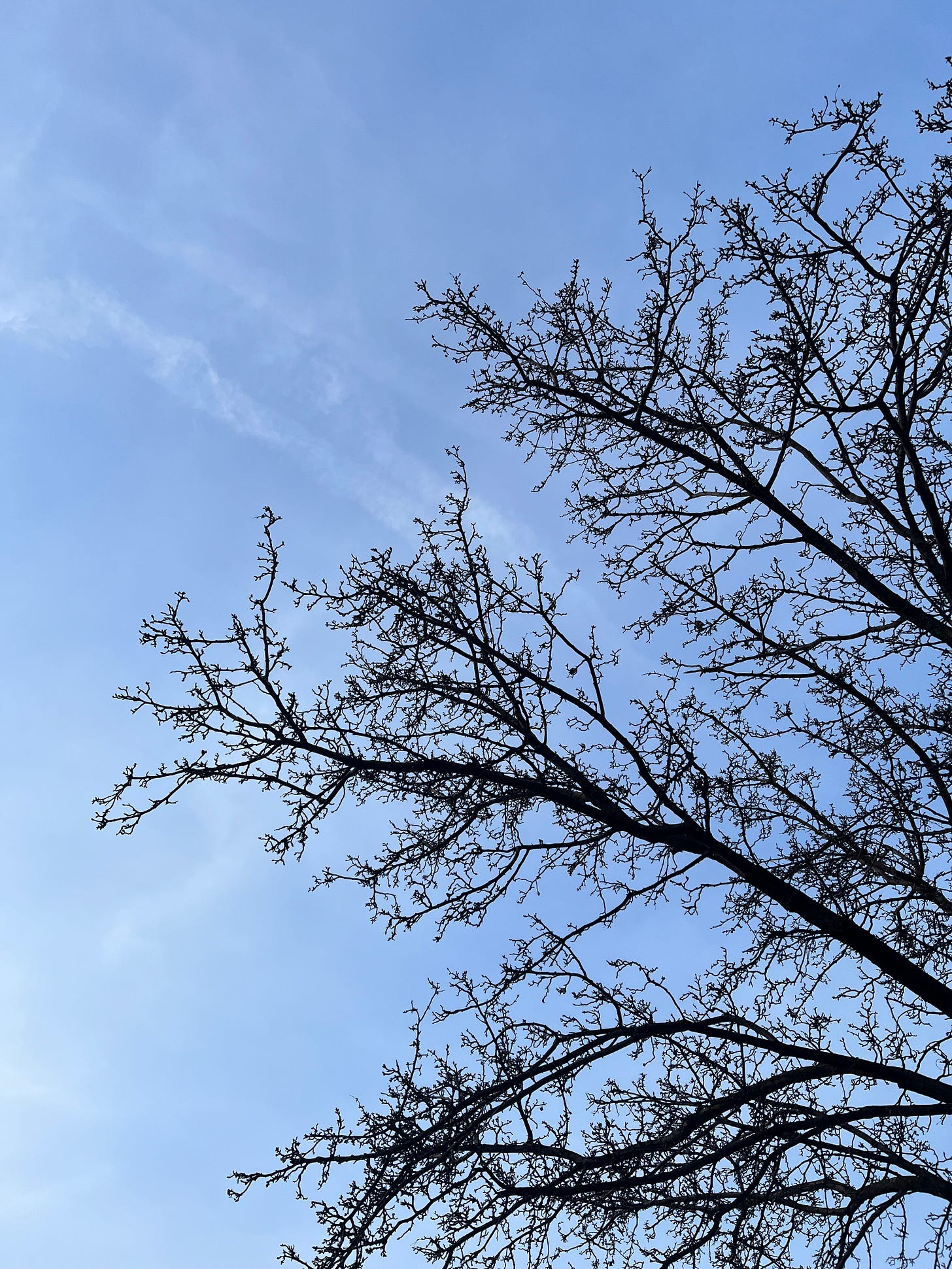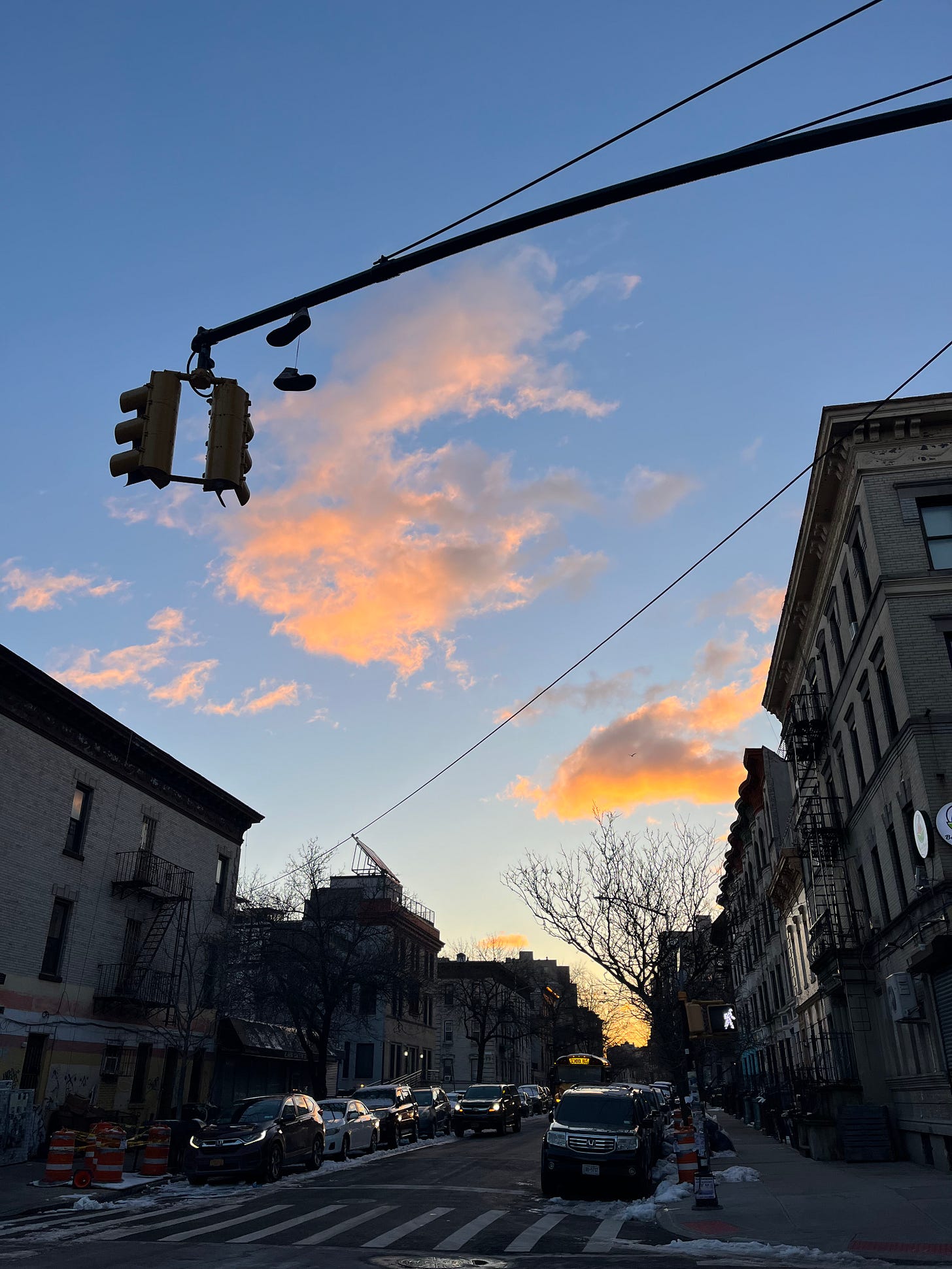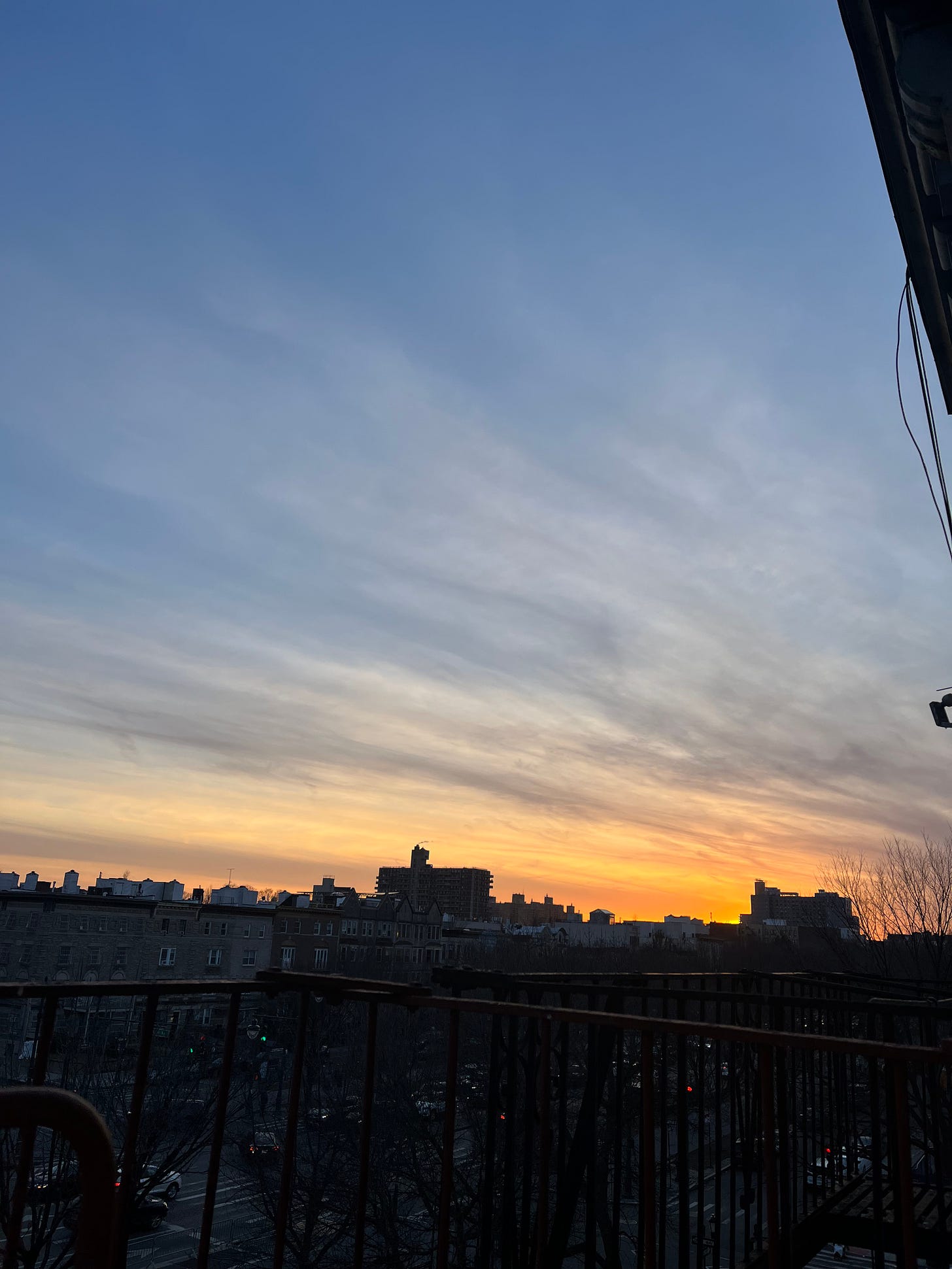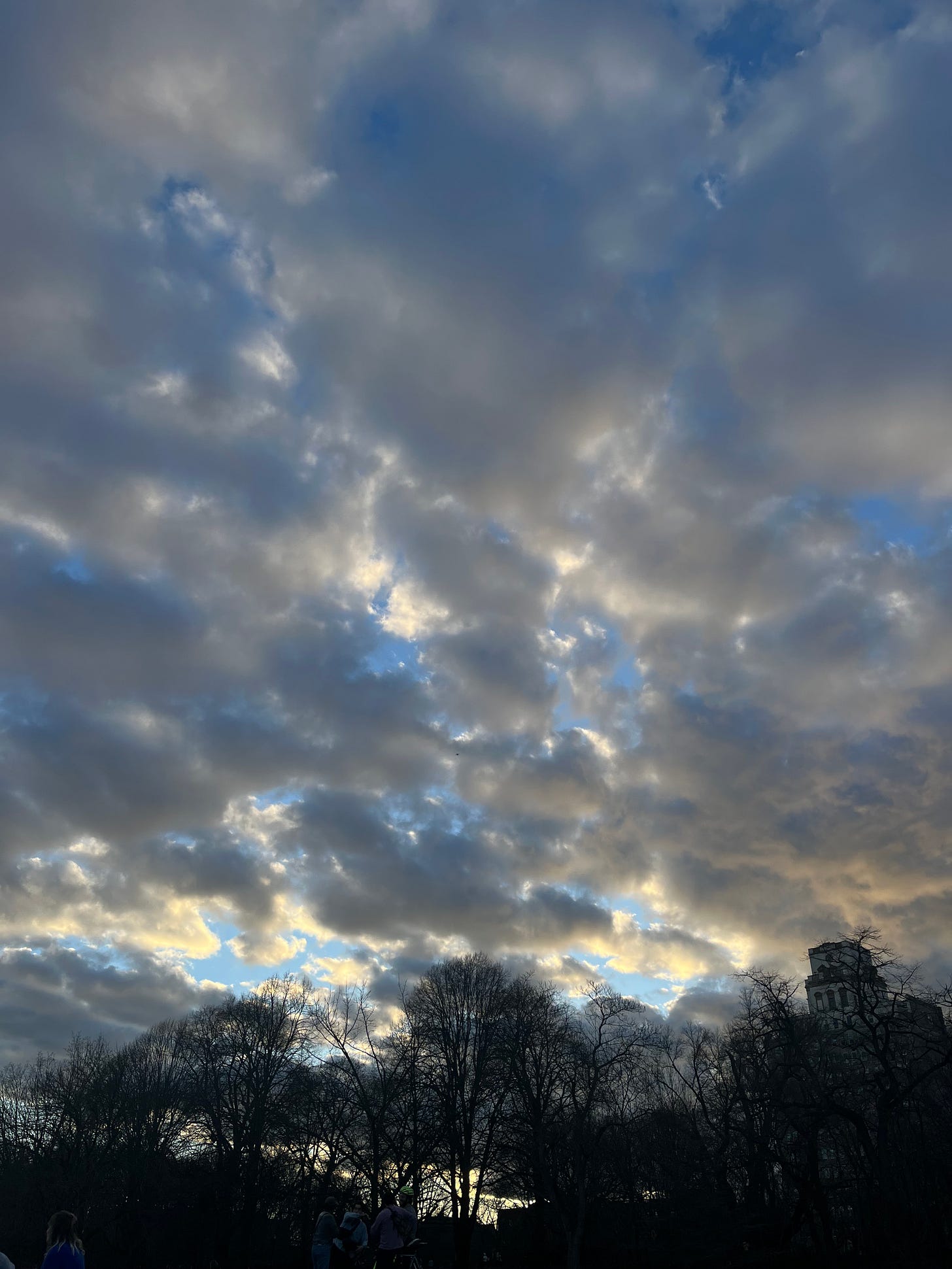being afraid
what's the point?
Monday, February 26, 2024
Somewhere in the 3 o’clock hour, a man walked into a deli on the corner of Franklin Ave and Lincoln Place. He asked a guy working there to buy him a Black and Mild cigar. The bodega worker said no. They argued, and the man left. A little while later, just after 4 pm, the man returned with a gun. He and the bodega worker wrestled over it for a minute. Then, the man who wanted a cigar shot the man who wouldn’t give him a cigar in the back of the head. One man ran away on foot, while the other died in the bodega.
In broad daylight, they say, though the daylight felt narrow that day, this being February in Brooklyn. Within hours it was dark, and the victim’s mother was giving a composed interview to a crescent of TV journalists. Yellow caution tape stretched around the corner. There is a picture of a puddle of blood on pavement, chunked with dark red something. There is a picture of the mother’s long-nailed fingers holding her phone open to a selfie of her son smiling in his car. By the end of the night, there are candles circling the door of the bodega.
Tuesday, February 27, 2024
Somewhere in the 1 o’clock hour, a man walked into a cafe on the corner of Franklin Ave and St. John’s Place. He asked the girl working there for water. She said sure, we have water right there, and she pointed to the big metal dispenser at the end of the bar. No, he said, I mean a bottle. He was speaking quietly, so the girl leaned over the register, propping herself on her palms so that her heels lifted off the ground. Oh, she said, pointing now to the fridge near the door. There’s bottled water there. He looked at the fridge, stepped back, stepped forward. He was carrying an opened duffel bag, three colors of fabric peeking out. I don’t have any money, he said, I was just asking for it. The girl returned her feet to the floor. Oh. Well, we have free water. I can get you a bigger cup with a lid if you want. The man looked at the big jars of lemonade, iced tea, passionfruit juice. What about juice? he said. Can I have juice? I’m sorry, she said, my boss isn’t here, I can’t do that. Please? he said. I’m sorry. You can have water. Okay, he said. And, without water, he left.
That was me. The girl behind the counter. My boss had just left and I was the only one working. Tuesday is a slow day, and the four or five customers we had were all clustered toward the back of the cafe. When work is slow, time is slow, so it felt much later than 1.
The day had been strange. Nobody told me anything about the shooting. On my walk to work, at 6:45, the gray sky hung low and distended like the belly of a sick cat. That image comes to me so readily I must have stolen it. It was not raining but the air was wet. I must have walked by the memorial, the caution tape, but I did not see it. I opened the cafe alone, unlocking the massive padlock and lifting the rolling sheet of corrugated metal. I was tired, looking down the barrel of a long day, and so I poured myself a coffee and put on Beyoncé’s “Lemonade.” The first song, “Pray You Catch Me” was still playing out of the big speaker when two guys in suits came in and ordered drip coffee. One of them asked me who was singing. They introduced themselves as local news, asking if a few of their colleagues could come use our bathroom. Sure, I told them, no problem.
All morning I heard people referring to “what happened yesterday.” Were you here? someone asked my boss. He smiled and shook his head, laughing in his conspiratorial way. I’m always here, he said. On my lunch break at 11, I googled Crown Heights and clicked “News.” Oh shit, I told R, who was working on her laptop from the cafe that morning. Someone was shot yesterday.
After the man left, the one who wanted water, I felt fear climb my body like fire. My boss had left. R had left. I was stuck behind this bar. Three customers came in and I tried to keep them talking as long as I could. I search my memory now and have no idea what we talked about, or what they looked like, except that their presence seemed to me a protective shield. The door would open and I would twist my neck around. Trying too to act calm. After a couple minutes I texted my boss what had happened, and he called me. Do you need me to come back? He asked. No, I said, I was just letting you know.
Later, while I was juicing lemons in the kitchen, my boss told me that if I ever felt threatened, just give the person the thing for free, he didn't care. I told him that I didn’t really feel threatened by the man asking for water. Which was true. In the moment of asking he didn’t seem angry. He was just a guy who didn’t have money and who wanted something to drink. It just happened that people who didn’t have money and people who had guns had become tangled in my brain, and people who wanted something that I wouldn’t give them had become tangled with people who would shoot me in the back of the head.
I think I was a fearful child. I don’t have anyone to compare myself to except my brother, who was not afraid. He was doing wheelies on his bike, wiping out without a helmet and coming home all scraped and bloody. Sledding down our steep front steps, getting kicked out of Catholic School. I was scared of getting hurt, of getting in trouble, most of all of other people. For too long, I hid behind my mother’s leg when she ran into a friend at the grocery store or the post office. I never wanted to tell the waiter what I wanted, or to go up to the cashier alone, or to ask for help in a store. I was scared of kissing, then of having sex, then of not being wanted. Always of not being liked. I found myself attracted to friends who were bold, reckless, and honest, who allowed themselves to get into sticky situations with the self-assurance that they would be able to unstick themselves. I was always afraid of getting trapped. Where? By what?
I am a lot less afraid now, I think. I am stronger, more coordinated, and so have built a relationship of trust with my body where I let her do hard things. I have learned that it is possible to kiss someone and then run into them unexpectedly and not die. I have learned that when I tell people things about myself, they generally hold them with a lot of tenderness and understanding, and that the people I felt judged by in high school were either unhappy or not actually judging me. I am a pretty good driver, calm behind the wheel. When someone honks at me I just get out of their way. When I am on the 3 train at night coming home from Manhattan I feel like I am among people who could be my family, in that they are tired from a long day and just want to get home to their families. I do not feel like I am around people who want to hurt me.
I guess what I’m saying is that the fear at the cafe takes me by surprise. I hadn’t felt this acutely afraid since I was convinced I would die alone in an earthquake in Mexico City. The threat of seismic destruction unlocked something in me, and afterwards I couldn’t let go of the feeling that I was going to get in trouble, real big trouble, lose my safety and all my saved money, and everyone would know how foolishly I had behaved, how badly I had moved through life.
I felt this again on Tuesday. Why hadn’t I just given him a juice? Why was I so blindly accepting of what I thought were the rules? I worried, again, that I was a weak kind of person, incapable of acting autonomously and intentionally. I worried that if I were conscripted into participating in some great bureaucratic atrocity that I would dutifully carry it out, perhaps feeling an inkling of doubt or horror but never feeling that my feelings weighed more than the orders of some unseen authority, someone who may yell at me if I didn’t do the job right. This I think is why I don’t really crave power. My hindsight is pretty good (this is why I like writing), but my foresight is terrible.
Anyway, the fear dissipated after a while. I talked myself down: there is no reason why a shooting at one establishment on a certain block would portend another shooting at a different establishment on that same block. If anything, that guy, the one who killed the bodega worker, would almost certainly stay away from the area. And the street was full of people—that has to dissuade, right? My boss kept saying that “this kind of thing” happened every two to three years in the streets around Franklin Ave. His nephew was shot and killed here a few years back—on Lincoln, I think he said. He was hanging with the wrong crowd, he said.
It is interesting to try to pattern something like this. It’s a way of making sense. “Senseless” was a word that the victim’s mother kept using; it is a word that comes up a lot when we talk about gun violence in this country, signifying in part that the victims were widely agreed to be innocent. Not “hanging with the wrong crowd,” just doing their jobs/going to school/at their place of worship/dancing with friends. (“Victim” is another word we use a lot, one which I don’t particularly like, collapsing as it does the entire life and identity of a person into the moment of violence, but for the sake of expediency sometimes we use the words on hand, the ones we have been taught.) “Senseless” is an interesting word to me. In English we speak about “making sense,” as if sense is a product that an event can manufacture. This is different from Spanish, where you say something “tiene sentido,” it has sense. As in, sense as a property of something. The word “senseless” feels more in line with this framework: a shooting like this lacks sense, it doesn’t have it, sense is not part of the fabric of the event. For there to be sense, (here English returns) we have to make it.
And so the sense I made of it, for myself, was that if a shooting happened in this area every two-to-three years, I was safe for a while. Also that bodegas are different than cafes, and there is something different in wanting a cigar or a cigarette or a beer than in wanting a coffee or a cup of water. Cafes are busier than bodegas. Also that if I ever felt really unsafe, I could quit. Also that I am white, and female, and from Massachusetts, and so move through the world with a higher degree of safety than the bodega worker who grew up in Crown Heights.
It feels bad to do this kind of calculus, bad also to size up someone else’s tragedy in terms of how much it signifies a threat to my life. But it is also the nature of violence to ripple, and for a day or two I found myself caught in one of the widening crests of this act, stifling a flinch every time someone reached a hand into an oversized jacket pocket.
I am trying to figure out what a proper relationship to fear is. Fear is an expectation of harm, and I think people tend to conform to our expectations of them. I do not want to be afraid of my neighbors. I do not want to be afraid of the world. I do not want to prefer my four-walled office and my little glowing screen to the wild unpredictability of physical reality. But I also don’t want to be stupid. I don’t want to ignore the surge of adrenaline that means get the fuck out. I don’t want to choose being polite or non-confrontational over protecting myself. I have this idea that if I can properly gauge reality, know with some degree of confidence what the real risk of a situation is, and learn how to act accordingly, then I can protect myself from harm. Is that how it works?





